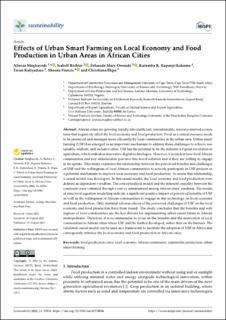Effects of Urban Smart Farming on Local Economy and Food Production in Urban Areas in African Cities
Moghayedi, Alireza; Richter, Isabel; Owoade, Folasade Mary; Kapanji-Kakoma, Kutemba K.; Kaliyadasa, Ewon; Francis, Sheena; Ekpo, Christiana
Peer reviewed, Journal article
Published version
Permanent lenke
https://hdl.handle.net/11250/3043933Utgivelsesdato
2022Metadata
Vis full innførselSamlinger
- Institutt for psykologi [3143]
- Publikasjoner fra CRIStin - NTNU [38679]
Sammendrag
African cities are growing rapidly into inefficient, unsustainable, resource-starved ecosystems that negatively affect the local economy and food production. Food as a critical resource needs to be produced and managed more efficiently by local communities in the urban area. Urban smart farming (USF) has emerged as an important mechanism to address these challenges to achieve sustainable, resilient, and inclusive cities. USF has the potential to be the industry 4.0 green revolution in agriculture, which embodies innovative digital technologies. However, it is unclear how local African communities and key stakeholders perceive this novel solution and if they are willing to engage in its uptake. This study examines the relationship between the perceived benefits and challenges of USF and the willingness of local African communities to actively participate in USF projects as a potential mechanism to improve local economy and food production. To assess this relationship, a causal model was developed. In this causal model, the local economy and food production were defined as dependent variables. The conceptualized model and the inherent causality between the constructs were validated through a survey administered among African cities’ residents. The results of structural equation modelling indicate a significant positive impact of perceived benefits of USF as well as the willingness of African communities to engage in this technology on local economy and food production. Only minimal adverse effects of the perceived challenges of USF on the local economy and food production have been found. The study concludes that the benefits and willingness of local communities are the key drivers for implementing urban smart farms in African metropolitans. Therefore, it is recommended to focus on the benefits and the motivation of local communities in African cities where USF shall be further developed, rather than on the barriers. The validated causal model can be used as a framework to facilitate the adoption of USF in Africa and consequently enhance the local economy and food production in African cities.

